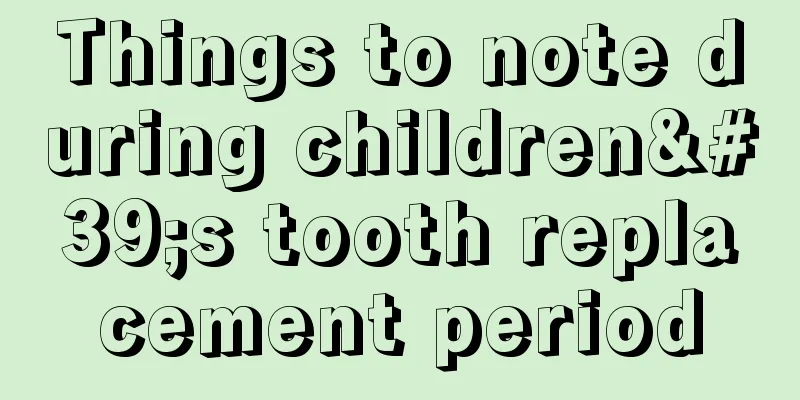Things to note during children's tooth replacement period

|
As we all know, children go through two tooth replacement periods. For many parents, this period means their children growing up. However, they did not realize that this was also an extraordinary period and some precautions needed to be taken. Because the health of a child's teeth is directly related to the health of his body. Whether the teeth grow neatly will affect their self-confidence. Therefore, it is important to pay attention to children's tooth replacement period. What matters should be paid attention to during the period of children's tooth replacement? This requires more care and protection from parents. Because children are not mature during the teething period, and do not know the importance of teeth, but are very interested in food. Therefore, in order to avoid unhealthy and incorrect teeth, parents should remind their children of the precautions during the tooth replacement period. 1. Always pay attention to the growth of your baby's deciduous teeth and permanent teeth, and take your baby to the dentist regularly so that problems can be discovered at any time and resolved early. 2. Encourage your baby to brush his teeth every day. It is best for an adult to help brush his teeth before going to bed at night, especially the upper teeth, which are more difficult to clean and most likely to cause tooth decay. The six-year molars are also not easy to brush because they are located at the innermost part of the mouth. You should use toothpaste and toothbrush specially designed for children. The toothbrush head should be as small as possible, otherwise the baby will easily vomit when you reach the innermost part. In addition to brushing teeth, it is best for your baby to rinse his mouth after each meal to maintain oral hygiene. 3. During the period of teeth replacement, babies should eat more foods that are high in fiber and have a certain degree of hardness, such as fruits, carrots, beans, corn, etc., to maintain a good stimulation to the deciduous teeth and promote the shedding of deciduous teeth on time. On the other hand, it also helps to stimulate the facial and eye muscles through chewing movements, accelerate blood circulation, and promote the development of gums, jaws and facial bones, which is both healthy and beautiful. 4. To enhance the baby's calcium absorption, encourage the baby to eat more foods high in calcium, such as milk, cheese, tofu, canned fish, etc. At the same time, the baby should take enough vitamin C and D, because these two vitamins are helpful for calcium absorption. 5. Try to avoid your baby breathing through the mouth when sleeping (usually due to enlarged tonsils, or nasal diseases that cause difficulty breathing through the nose), because when the air flows through the mouth, the upper palate is subjected to upward pressure and cannot develop downward normally, causing the upper palate to bulge upward, and the left and right sides of the upper dental arch become narrower, with the front part protruding forward. As a result, the erupted incisors are not only tilted forward, but also misaligned, forming gaps in the teeth. 6. Correct your baby’s bad habits in time, such as sticking out or biting the tongue, biting fingers or pencils, licking teeth with the tongue, etc. These bad habits will affect the growth of your baby’s teeth and cause tooth deformation. 7. Special protection should be given to the baby's first permanent molar that grows out at around 6 years old - the sixth-year molar, because it has the function of positioning and determining the height of the teeth in the entire mouth, has a great impact on the baby's jaw and facial development, and also plays an important role in the eruption and arrangement of other permanent teeth. 8. Provide safety education to your baby regularly and try to prevent tooth loss due to trauma. The health of your teeth is not only affected by your diet, but can also lead to dental diseases due to the invasion of bacteria. Therefore, by paying attention to the precautions during my tooth replacement period, I can reduce the risk of dental diseases. Moreover, food is the most important thing for people. If people cannot eat well, their quality of life will be reduced. To sum up, the precautions during children's tooth replacement period cannot be ignored. |
<<: Symptoms of heat stroke in children
>>: What to eat when children have anorexia
Recommend
What should I do if my baby has stomachache at night?
Many parents will encounter the situation that th...
Baby's stool after eating complementary food
I don’t know if you need to give your baby some c...
What to do if a newborn has spasms
Every parent hopes that their baby can be born he...
How to treat a four-month-old baby's stomach and intestines?
We all know that babies need to add some compleme...
How to deal with children’s orthodontic treatment?
Orthodontic treatment refers to the correction of...
At what age should children start brushing their teeth?
Brushing teeth can better ensure oral hygiene and...
Three-month-old baby care method
Nowadays, many parents are most concerned about t...
What should I do if my child has hemorrhoids?
Many people around us suffer from hemorrhoids to ...
What should I do if my four-year-old child suffers from long-term constipation?
Many children will have some eating problems afte...
What are the early symptoms of encephalitis in children?
Encephalitis is a very serious disease. If it occ...
Baby pollen allergy
In spring, everything comes back to life and the ...
Is it dangerous to do MRI for babies?
Some children suffer from internal diseases, so t...
What should we do if a newborn has congenital intestinal malformations?
The symptoms of gastrointestinal duplication are ...
What are some ways to cultivate children's imagination?
Every child is a completely different individual....
White spots on the child's face
White spots are usually what we call vitiligo. So...









